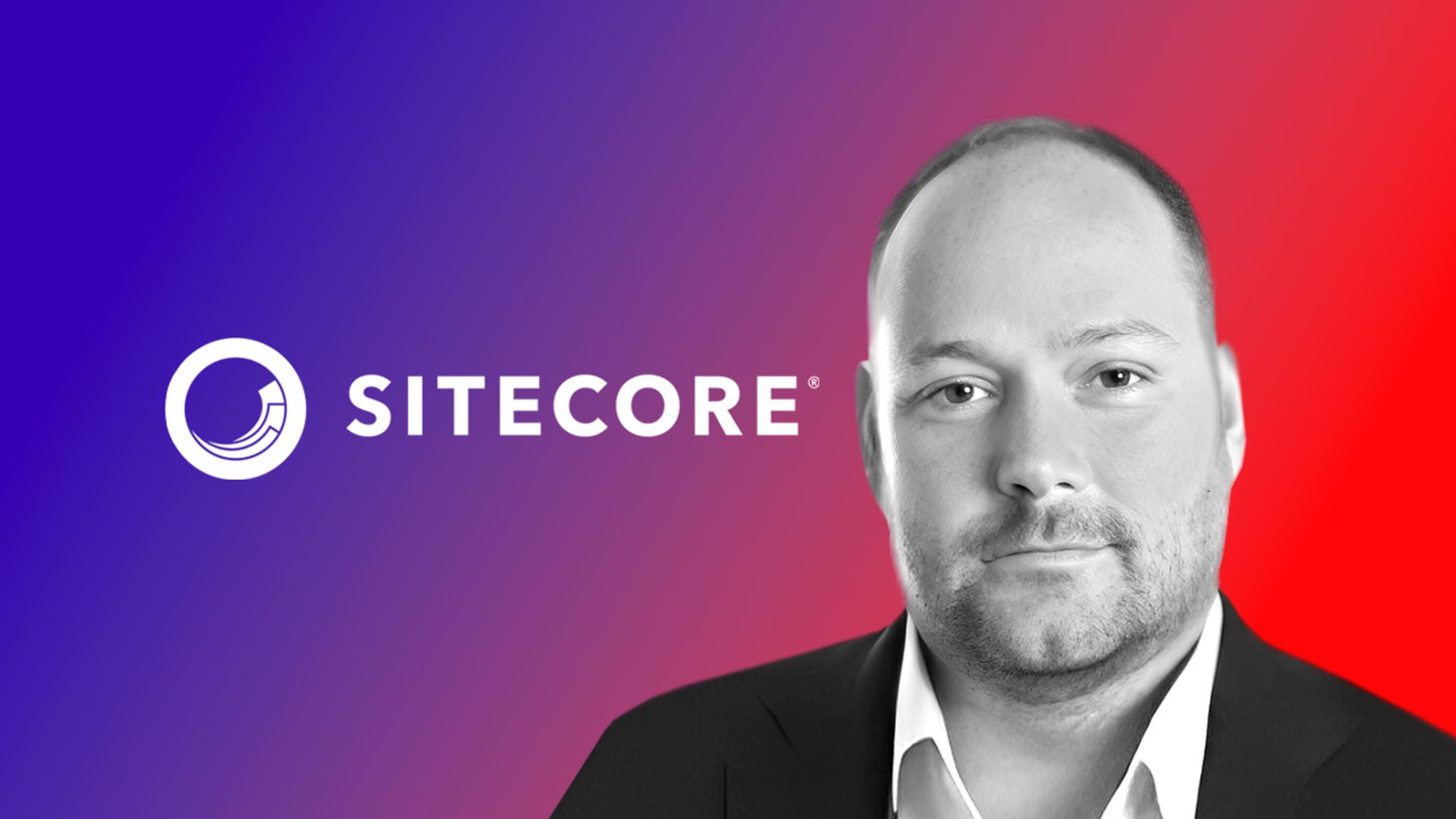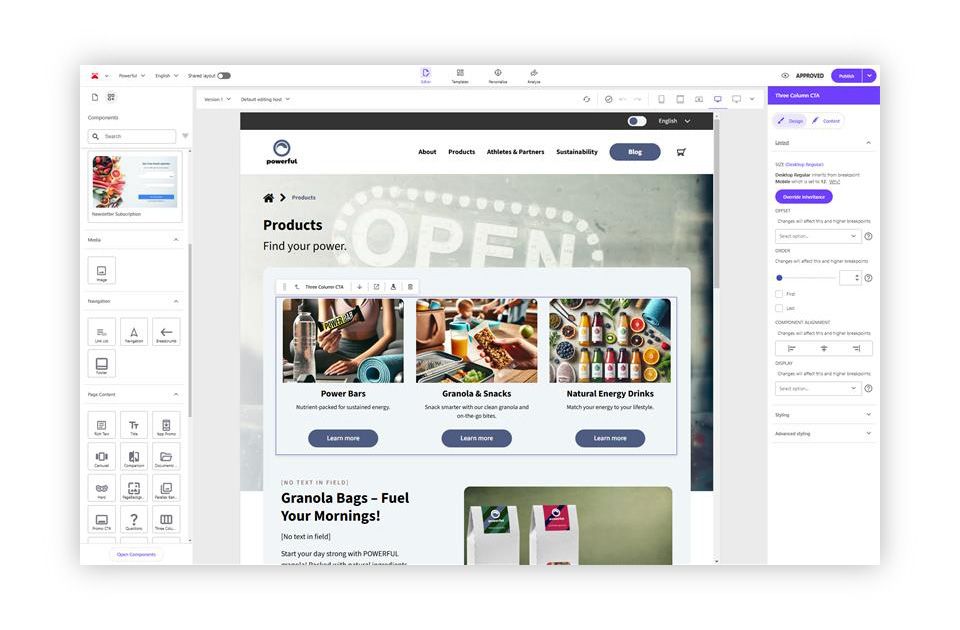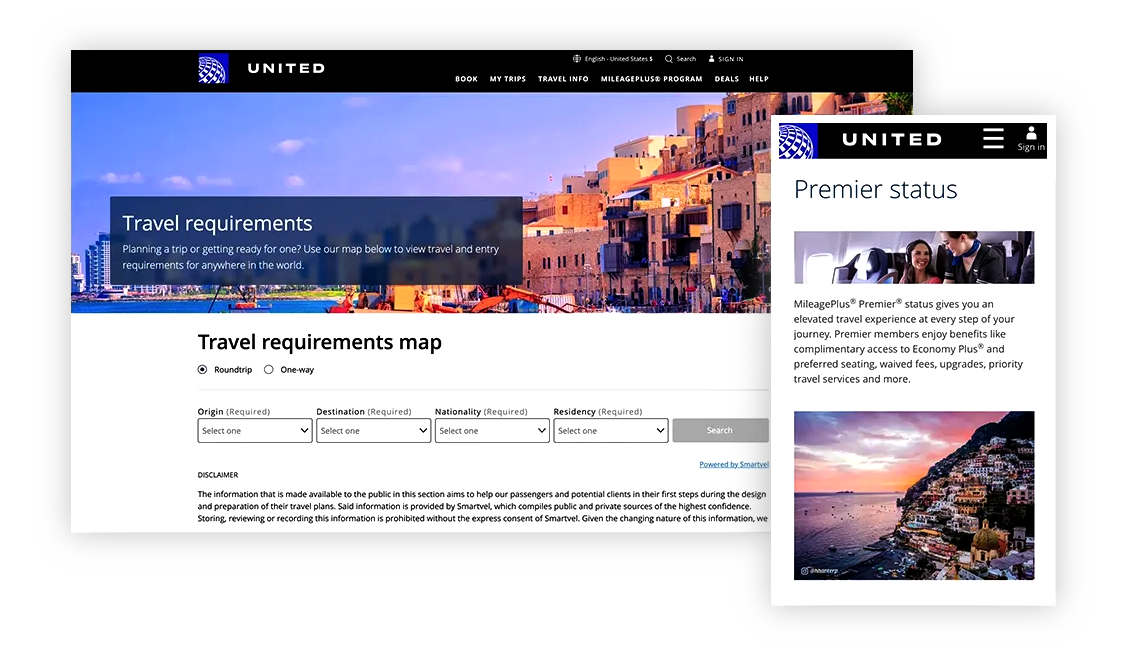Getting Loud with XM Cloud: Sitecore Reports 100% Growth of its AI-Powered Cloud-based CMS

The DXP’s innovative content management system continues to win over marketers and brands, helping them build digital experiences that drive traffic, engagement, and conversions. Chief Product Officer Roger Connolly tells us what’s behind this explosive growth – and where AI and personalization are driving real value.
If 2024 left you feeling a little whiplashed, you’re not alone.
A lot happened. AI changed everything – again. Markets struggled to find footing. And there was a presidential election here in the States that’s still reshaping the roadmap.
For Sitecore, it was a transformative 12 months, specifically around its focused investment in XM Cloud, the company’s signature AI-powered content management system. At Sitecore Symposium last November, I was told it was the fastest-growing product in Sitecore’s history. Cue the sonic boom.
We’re now getting a clear picture of how much XM Cloud spurred growth last year – and it was, shall we say, loud. Global revenue for the SaaS CMS grew 100% in 2024, with 130% growth in the U.S. alone. That’s healthy demand by any measure and reflects how brands and marketers are embracing the platform to drive the future of their digital experiences.
This growth data also comes on the heels of a stellar fiscal year. In October, Sitecore announced it had surpassed $500 million in annual recurring revenue (ARR), attributing the spike to strong demand for its composable digital experience platform (DXP). Now, as we dig deeper into the granular data, it’s clear that XM Cloud has been a standout performer.
Marketers continue to be at the heart of this CMS renaissance in the cloud. When I caught up with Sitecore’s CEO Dave O’Flanagan late last year, we spoke about the challenges these individuals and teams face – and why vendors are, in some cases, focusing on the wrong things.
“When marketers sit down at their desk every day, they're not thinking about products,” he reflected. “They're thinking, ‘How do I solve for my customers?’”
He’s right: Vendors have lots of products. But the real differentiated value comes from trust – from understanding what’s at stake for them to do their job more effectively. That’s where Sitecore’s XM Cloud seems to owe some of its triple-digit growth: by delivering a marketer-first CMS that’s guided not only by innovation – but customer success.
A stronger focus on CMS
Along with the XM Cloud announcement, Sitecore published a report that reveals some of the limitations brands face when using modern CMS platforms. It waxes on the state of websites in 2025 and how marketers are adapting to changes in digital trends. There are definitely some solid findings, and it's worth digging into.
Websites are still the most important channel for most organizations. While they remain incredibly relevant, this research illuminates a shifting landscape – one in which CMSes might not be ready for what’s next.
According to the data, only a third of the global marketers surveyed believe their content management system supports effective personalization, and just 13% are “very confident” that their CMS will help them unlock the potential of AI. This reveals a tacit lack of trust for future-proofing in critical areas that will guide the next wave of experiences.
DXPs have certainly made their case in the market, assembling integrated stacks for a broad range of enterprise applications. As composable became fashionable, they pursued a modular posture, emerging with more flexible and adaptable offerings. But under it all, content management has remained central to every architecture.
The blossoming demand for XM Cloud might reflect a trend back to CMS as a foundational tool. This isn’t hyperbole; according to Forrester, the CMS market is outpacing the broader software market and is expected to reach $15.3 billion by 2028. The growth of XM Cloud also illustrates a preference for simplicity as marketers and organizations drift toward cloud-based SaaS solutions that reduce friction.
While buying drivers vary, most decision-makers are focused on a similar set of requirements – with interoperability and composability at the top of the list. Marketers are also pining for CMS solutions that get the job done and meet their objectives. Simultaneously, enterprises are still seeking secure, scalable, integrated solutions with more robust service and support. It's a tall order for most vendors to deliver on.
As the foundation of its composable DXP, XM Cloud is the gateway to Sitecore’s broader ecosystem of products and services. That gives CMS buyers more confidence – regardless of where they are in their journey – that a dependable, market-tested partner is around for the long haul, and committed to their evolving needs.
Powering customer success with XM Cloud
XM Cloud has certainly established its value, giving teams a proven solution for managing complex content lifecycles and delivering more engaging experiences that differentiate their brand. The product weaves together the best features of a modern SaaS CMS for building websites and digital experiences faster while providing a host of next-gen AI-powered capabilities.

Sitecore XM Cloud offers more flexibility to create, personalize, and publish content. Source: Sitecore website.
We took a closer look at XM Cloud last year, but you can run through a quick visual tour highlighting key features like visual page editing, multilingual and multisite management, personalization, and analytics.
Unlike its legacy Sitecore Experience Platform (XP), XM Cloud offers an agile, cloud-native environment that eliminates many of the challenges around deployment and maintenance. That means no upgrades and high availability performance, enabling creators to really focus on content and experiences.
At the same time, Sitecore has been conscious of its broader product ecosystem and its strong base of loyal users. According to Dave O'Flanagan, the company has been careful to make the evolution to XM Cloud as seamless and attractive as possible while recognizing that its legacy solutions still serve a critical role in the mix.
“We wanted to make sure that customers don't feel that they have to go to SaaS to deliver for their business, and that's an important piece,” he said. “Our SaaS solution has great capabilities and will deliver in a more intuitive, innovative way. However, with XM and XP, customers can achieve almost everything they need with those products if properly configured and properly understood.”
As Dave noted, Sitecore has reworked its entire go-to-market strategy to be far more customer-focused. That means every single customer has a dedicated account manager tasked with understanding their business and how much they’re using Sitecore’s products. The goal is to answer one key question: How do we help them get more value out of our products?
Fulfilling the AI Dream with Stream
Turning up the XM volume is just one area where Sitecore is accelerating market momentum. The introduction of stronger personalization tools has been key, as well as the injection of AI-driven marketing with Sitecore Stream, which promises to orchestrate the marketer experience across Sitecore’s entire ecosystem – including XM Cloud, Content Hub, and XP.
According to the company, 2025 is already reflecting huge demand for Stream, with its embedded AI capabilities now infused across all solutions in Sitecore's full DXP offering. Marketers stand to benefit from a multitude of streamlined features, including brand-safe AI to deliver consistent quality, AI-driven insights to elevate marketing strategies, and enterprise-grade security to protect customer data.
Sitecore calls Stream its “secret weapon” for marketers. After seeing it in action at the Symposium (where it was rolled out), its ability to simplify marketing workflows and enhance productivity through orchestration, content intelligence, and automation could be decisive in the daily battle to drive marketing objectives.
Like I said before: AI changed everything – again.
Talking product with Roger Connolly
With XM Cloud driving significant growth, it’s clear that CMS has become a strong arrow in the company’s DXP quiver. I wanted to get a better picture of what’s happening, so I caught up with Sitecore’s Chief Product Officer, Roger Connolly.

For almost seven years, Roger has helped to shape the DXP’s product horizon, planting his roots in Sitecore’s Content Hub, specializing in digital asset management (DAM) technologies, and evolving upward across the Sitecore stack. In our exchange, we covered personalization, composability, and how AI continues to shake things up.
The XM Cloud “Growth Effect”
One of my first questions was about the growth in XM Cloud, and where the energy was coming from. At Symposium in November, I discussed this with Dave O’Flanagan, and it sounded like opportunities were emerging from multiple places. Roger validated this.
“We’ve seen great adoption of XM Cloud from new and existing customers. It is our fastest-growing product,” he said. To back up this growth, he pointed to the key metrics from Forrester regarding CMS growth as well as Sitecore’s own research indicating that most marketers feel their platform is ill-prepared for things like personalization and AI.
“These present great opportunities for Sitecore and XM Cloud, which includes embedded AI, personalization, and other capabilities that marketers are looking for today to help them build.”
But what about marketers themselves? This is a central focus for Sitecore as it concentrates more energy on content management within the broader DXP stack. I asked Roger what part of XM Cloud’s performance is delivering the most impact, and he cited some spectacular customer outcomes.
“Marketers across many industries using XM Cloud see a variety of benefits,” he explained. “They've experienced improved efficiency, accelerated delivery, enhanced engagement, cost savings, and more. Customers have seen remarkable results."
In a surprising outcome, he shared that Sparebanken Vest, Norway's third-largest savings bank, achieved an 80% efficiency increase and reduced front-end development time by 88%, showcasing significant improvements in their processes.
What Roger and the Sitecore team hadn't anticipated was the extent to which engagement metrics would improve. This included Beyond Blue’s impressive 50% increase and reduced bounce rates across its website.
The critical role of websites
Websites face a precarious future in a brave new world of AI, but they’re still the most important digital channel for most businesses. XM Cloud is powering websites in a big way, but what about multichannel and omnichannel experiences? I asked Roger how Sitecore is helping to futureproof for those expanding channels.
“Websites have become far more than digital destinations,” he said. “In today’s digital-first world, they’re strategic platforms driving revenue, operational efficiency, and omnichannel engagement.”
Roger referenced my own coverage of Sitecore’s United Airlines case study, and how XM Cloud was used to deliver a digital experience that stretches far beyond websites to make travel easier for customers – and the overall digital experience better – with a Sitecore-powered digital signage solution.

Examples from the United Airlines website built by AmericanEagle.com. Source: Sitecore website.
“United worked with our partner Americaneagle.com to extend its existing platform from a traditional, on-premises environment to a composable and SaaS one,” he continued. “The composable architecture allows them to seamlessly combine various best-of-breed components. This makes it easy to develop applications and services that increase operational efficiency, modernize digital signage, and give travelers a better experience.”
A good example is United’s use of real-time data during boarding to let passengers know at the gate if the overhead bin space will be full before it is their time to board. If so, passengers can easily check their bag at the gate, before wandering down the aisle with all bins already full.
“We’re constantly iterating on XM Cloud to meet the demands of this new age of content where marketers and their AI assistants need to create, optimize and deliver personalized experiences across every channel. We’re focused on building a collaborative, marketer-driven CMS for the AI age where content is more discoverable, reusable and delivered blazingly fast all over the world. We’re excited about the innovations to come that will push Sitecore’s omnichannel capabilities to the next level.”
The “hype” around hyper-personalization
Personalization is generating a lot of energy and enthusiasm in the market and driving the shifts to modern platforms – with continued interest in headless CMS platforms. I asked Roger how Sitecore delivers greater value as a composable DXP, particularly when it comes to delivering AI-driven personalization at scale.
“Sitecore’s analytics and personalization options offer a comprehensive suite of tools geared toward improving customer engagement and tailoring experiences to individual needs,” he said. “We offer the only CMS on the market that embeds personalization and A/B testing seamlessly with analytics at no extra charge. Our solutions dependably provide insights into visitor behavior, helping customers to identify high-value customers and opportunities to tailor engagement strategies across web, mobile, email, and other channels.”
Because AI recommendations for A/B testing and personalization are embedded directly in XM Cloud, Roger feels Sitecore is well-positioned as the world’s best AI-powered CMS – which will help users overcome the challenges of realizing personalization at scale.
“Marketers have had a challenge with personalization because it is usually hard to aggregate the necessary data, develop the right hypothesis, execute the personalization rules and then measure it. It can take a long time,” he reflected. “Our AI helps suggest hypotheses that are relevant to the goals of the organization, as well as the support brand, site, and page objectives. The promise of personalization will finally be realized by this new age marketer.”
What’s next with AI?
It’s the billion-dollar question, even as Elon Musk makes a bid to control OpenAI. The technologies are shifting daily, and marketers are being impacted in profound ways. I asked Roger how Sitecore is supporting its users in an “AI-forward” manner, bringing democratization and choice to the equation while enhancing security and brand safety.
“Content generation, repurposing, and presentation are evolving to serve both human and AI consumption,” he replied. “Regardless of how content is discovered or presented, brands will want to control its delivery and ensure consumers recognize it as coming from a trusted source. Sitecore is prepared to support brands in this endeavor by continually innovating our core content services layer to provide brand awareness and semantic understanding. We’re committed to helping brands stand out with authentic, reliable content in a world where content will become cheaper and easier to produce.”
A big part of Sitecore’s AI strategy is Stream, and I inquired about its trajectory and future path. Are customers providing input that further enhances its value? In what other ways is it helping to secure a brand’s content?
“The feedback has been amazing so far,” Roger said. “Customers and partners have been able to get started and use it, [and] it simply just works. As we continue to roll out our product-related copilots this month, momentum will continue to grow. We continue to work closely with our customers to ensure our products deliver real value. We respect the trust customers place in us with their content, especially with AI being such a new technology, and we can only do it together.”
Given the recent DeepSeek news, change in AI is inevitable – and rapid. That might translate into disruptions around pricing models (among other factors). I asked Roger what gives Sitecore an edge from an innovation perspective.
“Our innovation stems from our ability to provide a brand-aware and brand-safe foundation for these new technologies and leveraging it to compress the time it takes to deliver at scale,” he said. “By focusing very deliberately on what we do best, which is managing vast content repositories and delivering digital experiences, our proposition is not simply providing access to a language model – it’s unleashing the marketer’s productivity directly inside their content and experience workflows.”
The Verdict
XM Cloud is certainly providing a lift for Sitecore. As Roger noted, interest coming from both new and existing customers bodes well for the DXP’s roadmap as it navigates a complex and highly competitive market – where bringing your legacy customers along for the ride is key to success.
Continued investment in AI is critical, and Sitecore Stream demonstrates the benefits of a comprehensive approach that orchestrates the marketer experience across products within its ecosystem. But Sitecore has been actively investing in AI and machine learning for quite some time, cultivating a bleeding-edge culture – so we can expect more innovation in this area.
I think the “throat-clearing” focus on marketers is cutting through the noise, buoyed by an AI-powered SaaS CMS that can meet creators at the right nexus point – specifically with personalization. Underpinning this is a renewed focus on the value of websites, and how XM Cloud is proving to be a critical tool for managing that channel while future-proofing for omni- and multi-channel applications with broader capabilities.
If you’re evaluating content management systems, XM Cloud brings some serious flexibility to the table.
It might be time to get loud.
Looking for guidance on Sitecore? Talk to an expert.
Upcoming Events

CMS Summit 25
May 13-14, 2025 – Frankfurt, Germany
Don't miss the first European edition of our prestigious international conference dedicated to the global content management community! CMS Summit 25 will bring together top-notch speakers, our renowned learning format, and engaging social events. Hear from leading practitioners like Deutsche Bahn, Dr. Oetker, and more – and join customers, agencies, and CMS vendors as we discuss current trends and what's ahead for the content and digital experience fields. Connect and network at the only vendor-neutral, in-person conference focused on CMS. Space is limited for this exclusive event, so book your seats today.

CMS Connect 25
August 5-6, 2025 – Montreal, Canada
We are delighted to present the second annual summer edition of our signature global conference dedicated to the content management community! CMS Connect will be held again in beautiful Montreal, Canada, and feature a unique blend of masterclasses, insightful talks, interactive discussions, impactful learning sessions, and authentic networking opportunities. Join vendors, agencies, and customers from across our industry as we engage and collaborate around the future of content management – and hear from the top thought leaders at the only vendor-neutral, in-person conference exclusively focused on CMS. Space is limited for this event, so book your seats today.
